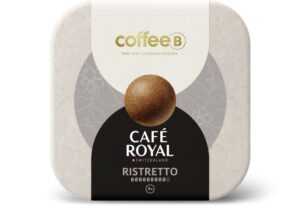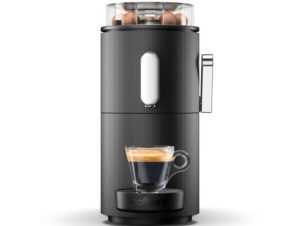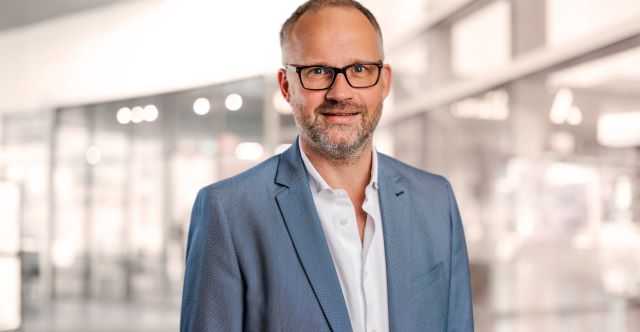MILAN – In September 2022, Migros launched CoffeeB, the world’s first coffee-capsule system that works entirely without capsules. The new system uses a fully compostable ball of pressed coffee. We spoke to Frank Wilde, Head of CoffeeB at Migros subsidiary Delica AG, who has been working on this new patented brewing technology for over five years.
With the coffee ball, you have gone one step further than compostable capsule. How did you come up with a compressed coffee ball coated in a fine plant-based protective layer?
Frank Wilde: For many years, we have been concerned about the issue of capsule waste,
which amounts to approximately 100,000 tonnes globally every year. With the growing
popularity of single-serve coffee the amount of capsule waste is also increasing. To address
this concern, we have collaborated with both our internal R&D department and external partners over the past five years to create a completely waste-free single-serve coffee system extensively studying various plant-based materials to test aroma protection and stability.
In the closed package, the shelf life is 14 months.
Our coffee ball has similar quality attributes to aluminium capsules, yet it possesses a
remarkable advantage – after brewing, you can dispose of the ball in your garden, and it will entirely decompose within a few weeks, without causing any environmental harm. Until
now, this unique technology was not available anywhere else globally.”
This brewing technology is the result of five years of research and development by Delica. Tell us about this long research process. How did it develop and how did you work together?
“Under the Delica subsidiary of Migros, CoffeeB was developed with its in-house R&D
department that possesses extensive experience in designing innovative coffee products and systems. After creating the coffee ball, our team developed a completely new brewing technology in a machine that can brew the compressed coffee ball to extract an exceptional cup of coffee.”
How does CoffeeB manage to preserve the quality of the coffee contained within the Coffee Balls?
“The coffee beans we use are sustainably grown and are of premium quality. Once roasted,
we grind the coffee and press it into a ball. The secret to preserving its aroma and stability is the thin plant-based layer that envelops it.
Then within the coffee machine the following process takes place:

First, water is used to moisten the coffee ball, clean it and to soften it. Then, the ball is
compressed and immersed in boiling water from both sides. Subsequently, the coffee is
extracted under high pressure with the water forced through the ball into the cup to extract
a great cup of coffee. After brewing, the ball takes on the shape of a soft, flat tomato, which can be disposed of in the garden.”
The machine costs € 169 in Switzerland. Is the price of this revolutionary product still attractive to the end consumer?
“We conducted extensive research across several countries to determine the optimal price
for this ground-breaking product, considering its ability to address one of the most
significant waste issues in the coffee industry. Consumers are indeed willing to pay a retail
price of 169 euros for such a sustainable coffee machine.
Naturally, we would like to offer the machine at a lower price, but its brewing technology is highly intricate, and this also incurs a cost. We believe that the end-user price is reasonable in the end. CoffeeB caters to individuals who desire high-quality coffee and a single-serve option that is also environmentally friendly. It may not be for everyone, but it is an ideal choice for those who value sustainability.”

When will CoffeeB be available in Italy?
“Regrettably, we are not a global corporation capable of introducing a product worldwide at
the touch of a button. At the moment, our concentration is in Switzerland, France, and
Germany. Once we have successfully launched CoffeeB in these countries, we can explore
the possibility of introducing it to other regions, such as Italy.”
And what about the launch of the paper-based capsule created by Nespresso. What do you think?
“Until now we haven’t seen the paper-based capsules and cannot therefore comment on it.
Our main competitor has been very successful in introducing high-quality portioned coffee
to the global market. However, the problem of aluminium waste from capsules is a major
concern, with only around 30% being recycled globally and the remaining 70% ending up in landfills. It is evident that all companies producing portioned coffee need to address the
issue of capsule waste. Therefore, we believe that any brand that is working towards a
sustainable solution in portioned coffee is commendable.
However, we firmly believe that CoffeeB offers consumers a genuinely sustainable
alternative to ensure high-quality portioned coffee over time, without any aluminum, plastic, or paper waste. Additionally, our coffee balls decompose within several weeks, unlike other degradable capsules, which can take months to degrade.”
Until now, what has been the feedback about CoffeeB?

“The response to CoffeeB has been overwhelmingly positive, with many people wondering because such a simple and sustainable solution hasn’t been developed before. We understand that it will take time for consumers to transition to a new system, like the
transition prom petrol to electric driving.
However, we believe that CoffeeB has the potential to become the future reference for
portioned coffee. We are pleased with the progress made since the launch and confident
that we are on the right track to make a positive impact on the world.”
Was it difficult to decide to make this revolutionary shape without capsules? Other sustainable capsules are often compatible with Nespresso systems. CoffeeB is not. Are you the Nespresso of the future?
“We realize that it may take a while for people to embrace our system, considering that the
average person changes their coffee machine every 4 to 5 years. Our goal is not to persuade consumers with a working coffee system to immediately switch to our machine; that would not be sustainable. CoffeeB is a long-term strategy, not a quick fix. We have confidence that over time, CoffeeB has the potential to become the standard in portioned coffee.”
But the machines are also systems built to meet the demand for greater sustainability, in materials and consumption: how did you achieve this, what materials are involved and how did you limit energy waste?
“Our machines are designed to fulfil the need for sustainable materials and consumption.
They have been built to be energy-efficient, allowing for rapid heating and cooling, and have a lifespan of over 7,500 coffees. In addition, our machines are highly modular, which makes them easy to repair. Our team has made it a priority to find the most sustainable solutions for all components of the system, as sustainability is a fundamental value of our brand. We are committed to making a positive impact through all our products.”
What are the next steps for CoffeeB?
“CoffeeB was recently introduced in Germany, which has a large coffee market and great
potential. Following our launch in Switzerland and France, our current focus is on these
three countries. However, our ultimate objective is to establish CoffeeB as the worldwide standard for single-serve coffee.”

















